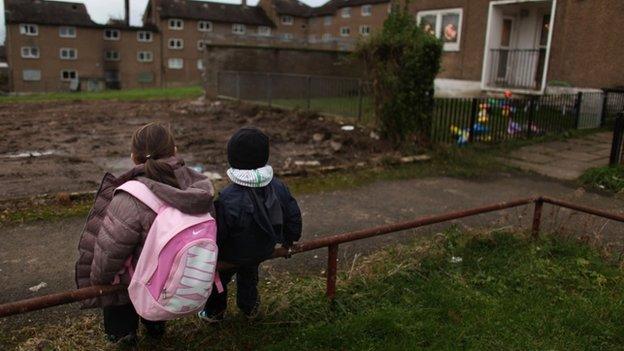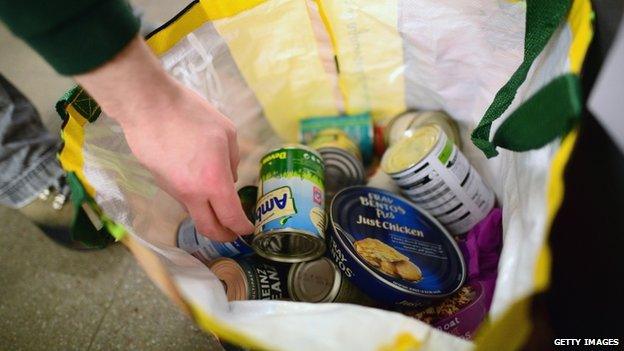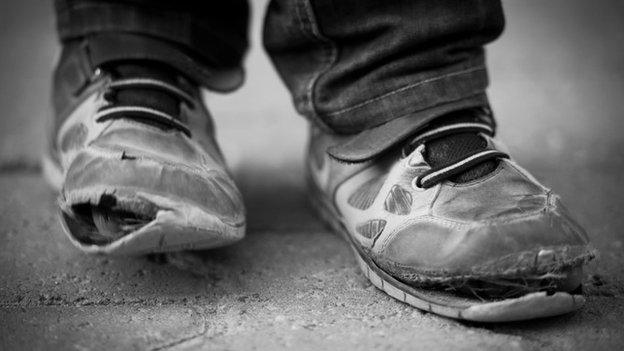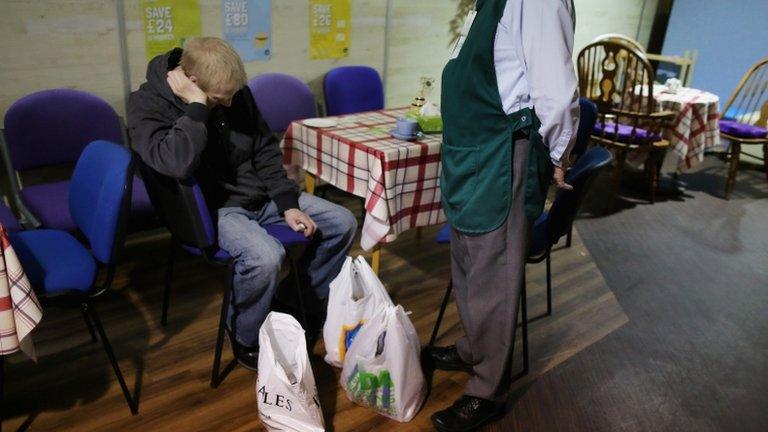One in 10 Scots 'in severe poverty'
- Published

More than half a million Scots, including 100,000 children, have been living in severe poverty, according to a Scottish government report, external.
The study said relative poverty had fallen over the past decade.
But it said a greater proportion of those struggling to get by were now facing either severe or extreme poverty.
People are classed as being in severe poverty if their household income is less than 50% of the UK average.
The report was based on data from 2012-13, when anyone whose household income was below £11,500 would have been classed as living in severe poverty.
Extreme poverty is defined as being 40% or less of the UK median annual household income - or less than £9,200 in 2012-13.
Housing costs
A total of 510,000 individuals - or 10% of the population - were living in severe poverty in 2012-13, the report said.
This included 330,000 working-age adults, 100,000 children and 80,000 pensioners.
But when housing costs were factored in, the number facing severe poverty increased to 710,000.
This included 500,000 who were in extreme poverty after paying their rent or mortgage. A total of 370,000 working-age adults, 90,000 children and 40,000 pensioners were all affected by this.
The report said that the problem of poverty had "deepened in recent years", saying while relative poverty had fallen over the decade from 2002-03, "a greater proportion of households in poverty are now in severe or extreme low income".
It added: "Those in poverty in 2012-13 are more likely to be in extreme low income than in 2002-03.
"This is especially the case after housing costs: in 2012-13, 50% of all people in poverty lived in extreme low income after housing costs, compared with 36% in 2002-03."

The use of foodbanks has been increasing in recent years
Changes in employment were one reason given for the rise in severe and extreme poverty, with the report stating: "There have been decreases in real earned income, a rise in insecure employment (including zero hour contracts) and increases in the numbers in low pay.
"The combination of these factors is likely to increase the numbers living in severe and extreme poverty, and reduce the chances of those in low-paid work to lift their families out of poverty."
Inflation has seen costs rise faster then wages, with this "adding to the pressures being experienced by low-income families".
The research also said that "welfare reform is another key factor", adding: "For low-income working families reliant on benefits and tax credits, cuts combined with changes in eligibility have seen household income decrease in 2012-13."
The report concluded: "In short, poverty is changing; work is no longer a guarantee of a life free of poverty; people in poverty face increasing costs; and those in receipt of benefits and tax credits - which of course includes many in work - are finding their incomes squeezed."
Scottish Social Justice Secretary Alex Neil said it was a "disgrace" that so many people were affected, and claimed it was an "unfortunate and inevitable result of the UK government's failed austerity agenda and welfare cuts that are slashing incomes for some of our poorest households".
'Substantial powers'
Mr Neil added: "With employment increasing and unemployment down, Scotland is outperforming the rest of the UK, yet the statistics show that a job is no longer any guarantee against severe or extreme poverty.
"That's why we opposed cutting in-work tax credits and why the Scottish government and its agencies are paying the living wage, encouraging other employers to follow suit."
A UK government spokesman said there was "no simple solution" to alleviating poverty.
"We are supporting the living standards of poor families by freezing fuel duty, increasing personal tax allowance and cutting income tax for those on the minimum wage by almost two-thirds," he added.
"In addition, the Scottish government has substantial powers at their disposal on areas such as childcare, education, health and housing - all essential for helping those most in need.
"We need to bring all of that together in a joined-up approach across all areas of government in Scotland."
Meanwhile, Scottish Labour leader Jim Murphy has announced a commission to address the problem of low pay in Scotland.
Mr Murphy said the commission would report later this year on how the party's vision of eradicating low wages could be achieved.
It will by led by MSPs Jackie Baillie and Neil Findlay and include representatives from Poverty Alliance Scotland, RBS, the Federation of Small Businesses, shop workers' union Usdaw and Barnardo's.
The announcement was made in advance of a Labour summit in Glasgow this week on the living wage, which will bring together trade unions, business leaders and anti-poverty groups and inform the commission's work.
Mr Murphy said: "I'm making it my mission to abolish low pay in Scotland.
"Too many Scots families are just a rainy day away from real financial trouble. More than one in four Scots get paid less than the living wage. This isn't right, and we need to fix it fast."
- Published13 March 2015

- Published4 March 2014
